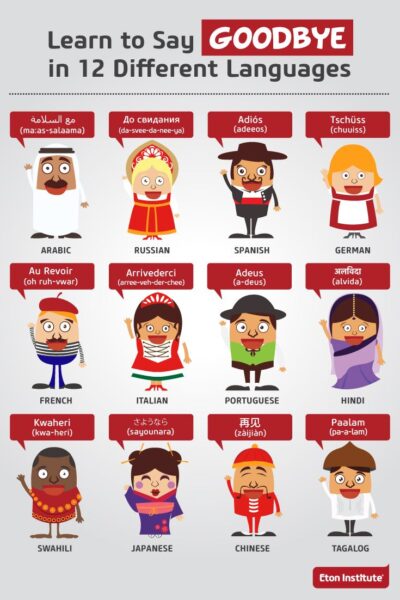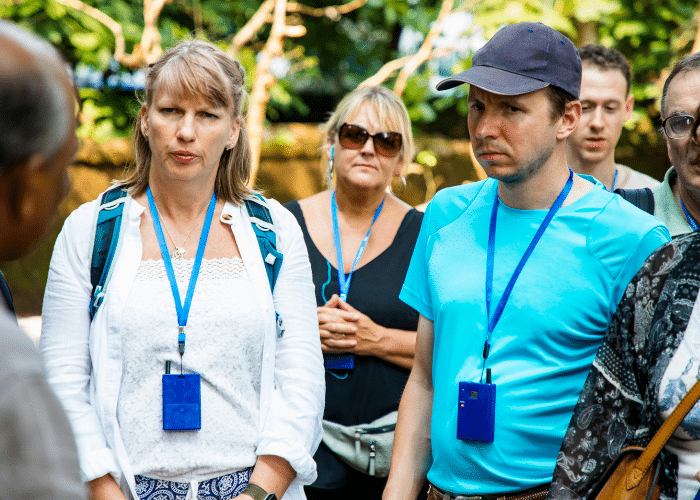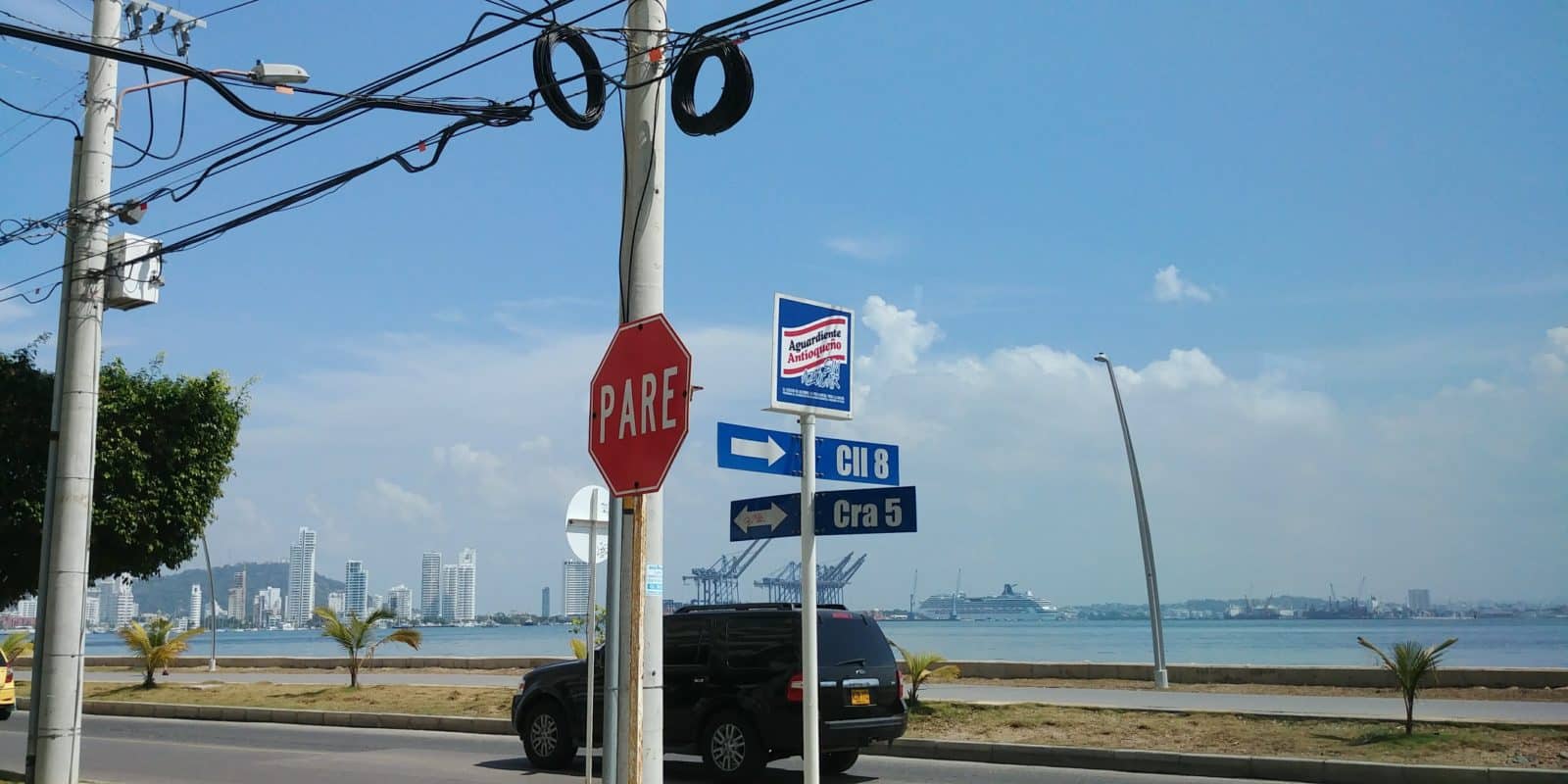Don’t Let the Language Barrier Stop You: Ten Travel Phrases to Learn before your next trip.
My husband and I recently went on a cruise to the Panama Canal, and I was so grateful that I had learned a few basic Spanish phrases before I went.
After getting off the ship, we made our way to the meeting point for our tour. We didn’t see the tour guide, and I had my first opportunity to use my new Spanish skills.
We found a small convenience store and asked the clerk to help me call our guide.
It turns out we were early, but I was glad that I was able to communicate with the clerk in Spanish.
It was a great reminder that learning a few basic phrases in the local language can be really helpful, even if you’re just trying to buy a soda.
Traveling to a new country can be an amazing experience, but it can also be a bit daunting, especially if you don’t speak the local language.
Learning a few basic phrases can make a big difference. It can help you to communicate with locals, get around more easily, and have a more authentic travel experience.
In this post, I’m going to share 10 essential travel phrases that will make your trip easier, no matter where you’re going.
I’ll also include common Spanish, Tagalog, Portuguese, and French phrases for travel.
In addition to these essential phrases, I’ll also provide some tips on how to learn a new language quickly and easily.
Then, I’ll discuss the benefits of learning a new language and how it can enrich your travels.
Whether you’re planning a short weekend getaway or a long-term backpacking trip, learning a few basic phrases in the local language is a great way to prepare.
It will make your trip easier and more enjoyable, and it will help you to connect with the locals on a deeper level.
When Spanish saved the day
Practicing the 10 essential travel phrases came in handy on our recent trip to the Western Caribbean when we visited Cozumel, Belize, and Roatan.
In Roatan, I became ill and needed to buy a prescription. The pharmacy staff didn’t speak English, so I had to rely on my memory and my high school and college Spanish skills.
I was able to explain my symptoms and ask for the medication I needed. The pharmacist was impressed that I could speak Spanish, and he was happy to help me.
I’m so glad that I took the time to learn a few basic Spanish phrases before our trip. It made a big difference in my ability to communicate with locals to get the help I needed.
Languages by numbers
The most spoken language in the world is Mandarin Chinese, with over 1.1 billion native speakers. Mandarin Chinese is spoken in China, Taiwan, Singapore, and other parts of the world.
Here is a list of the top 10 most spoken languages in the world, according to Ethnologue:
| Rank | Language | Native speakers (millions) |
|---|---|---|
| 1 | Mandarin Chinese | 1,118 |
| 2 | Hindi | 602 |
| 3 | English | 380 |
| 4 | Spanish | 485 |
| 5 | French | 280 |
| 6 | Bengali | 265 |
| 7 | Russian | 258 |
| 8 | Portuguese | 257 |
| 9 | Urdu | 231 |
| 10 | Indonesian | 199 |
English is the most spoken language in the world when native and non-native speakers are included. It is the official language of over 60 countries and is widely spoken in business, education, and entertainment.
Why learn other languages?
- To be a better traveler: Speaking the local language will immediately increase the value of your travel skills. You won’t find yourself stuck at the usual tourist traps unless you want to be there.
- To connect with people: When you can speak even the most basic version of the language, you will get more people willing to help you out. Without essential language skills, you might be stuck in the tourist spots or ship-owned port areas and miss out on real cultural experiences.
- To save money: Tourist traps are not the least expensive places to choose. Once you get comfortable using your newfound language skills, you will find that moving away from places like the port areas and ship-sponsored excursions is not so scary. You can then book independent tours, which will be of better quality and might even save you money.

Video: Body language in different cultures
Body language
Body language and gestures can vary greatly from culture to culture.
It is important to be aware of these differences to avoid misunderstandings or offending others.
Here are a few examples:
- Eye contact: In some cultures, such as the United States and Western Europe, direct eye contact is seen as a sign of confidence and respect. However, in other cultures, such as Japan and Korea, direct eye contact can be seen as rude or aggressive.
- Smiling: In some cultures, such as the United States and Australia, smiling is seen as a sign of friendliness and openness. However, in other cultures, such as Japan and Russia, smiling is less common and may be reserved for close friends and family.
- Head nodding: In some cultures, such as the United States and Bulgaria, nodding the head means yes. However, in other cultures, such as India and Greece, nodding the head can mean no.
- Pointing: In some cultures, such as the United States and the United Kingdom, pointing is considered rude. However, in other cultures, such as China and Vietnam, pointing is a common way to get someone’s attention.
- Touch: In some cultures, such as the United States and Western Europe, physical touch is reserved for close friends and family. However, in other cultures, such as Latin America and the Middle East, physical touch is more common and may be used as a sign of greeting, affection, or respect.
It is important to be aware of these cultural differences when traveling or interacting with people from other cultures.
By being mindful of your body language and gestures, you can avoid offending others and show that you are respectful of their culture.
Here are a few examples of how body language and gestures can be different in other cultures:
- In Japan, it is considered rude to point at people or things. Instead, it is customary to use a closed fist with your thumb extended and wiggle it in the direction of what you are pointing to.
- In India, it is considered rude to show the soles of your feet to others. This is because the soles of the feet are considered to be unclean.
- In Thailand, it is considered rude to touch someone’s head. This is because the head is considered to be the most sacred part of the body.
- In the Middle East, it is considered rude to show too much skin. This is especially true for women.
- In Latin America, it is common to greet people with a kiss on the cheek, even if you are meeting them for the first time.
Knowing about these cultural differences is just as important as knowing the language.
It shows that you are respectful of other cultures and that you are trying to make an effort to communicate with people on their terms.
Alternatives to learning local language
If you don’t have time to learn a local language, here are some alternatives that you can use with your smartphone:
- Translation apps: There are a number of translation apps available for smartphones, such as Google Translate, Microsoft Translator, and iTranslate. These apps can translate text and speech from one language to another, and they can be very helpful in communicating with people who don’t speak your language.
- Phrasebooks: There are also a number of phrasebook apps available for smartphones, such as Lonely Planet Phrasebooks and Rosetta Stone Phrasebooks. These apps can teach you basic phrases in a variety of languages, and they can be helpful for getting around and communicating with people in simple ways.
- Sign language apps: If you are traveling to a country where sign language is widely used, there are a number of sign language apps available for smartphones, such as SignBank and ProDeaf. These apps can teach you basic signs in the local sign language, and they can be very helpful for communicating with people who are deaf or hard of hearing.
- Language exchange apps: There are also a number of language exchange apps available for smartphones, such as Tandem and Hellotalk. These apps allow you to connect with native speakers of the language you are learning, and you can practice speaking and writing with them. This can be a great way to improve your language skills quickly, even if you don’t have a lot of time.
In addition to these apps, there are a number of other things you can do to make communicating easier when you don’t speak the local language.
For example, you can try to learn a few basic phrases in the local language, such as “hello,” “goodbye,” “thank you,” and “excuse me.”
You can also use gestures and facial expressions to communicate, and you can try to write down what you want to say if you can’t speak it.
Finally, it is important to be patient and understanding when communicating with people who don’t speak your language.
It may take some time and effort to get your point across, but with a little perseverance, you will be able to communicate effectively.
The most important travel phrases
These are the ten most important travel phrases. The phrases included are all essential for communicating with locals, getting around, and ordering food and drinks.
They are also relatively easy to learn, so even if you don’t have much time to prepare for your trip, you can still learn these basic phrases.
Of course, there are many other useful travel phrases that you could learn, but these ten are a good starting point.
Once you have mastered these basic phrases, you can start to learn more complex phrases and expressions.
The basic phrases to learn in any language:
- Please
- Thank you
- Hello
- Goodbye
- Yes
- No
- How much does it cost?
- Can I have…
- How do I get to…
- More slowly, please.
- I am sorry
- Sorry, I don’t understand.
The travel phrases
(Translations for Spanish, French, and Portuguese according to Google Translate)
Spanish words you need to know when traveling
- Please and Thank You: Por favor, Gracias
- Hello and Goodbye: Hola, adiós
- Yes and No: Sí, No
- How much does it cost?: ¿Cuánto cuesta?
- Can I have…? ¿Me trae dos cafés, por favor?
- How do I get to…? ¿Cómo llego a…?
Common French phrases for travel
- Please and Thank You: S’il vous plaît, Merci
- Hello and Goodbye: Bonjour, Au revoir
- Yes and No: Oui, Non
- How much does it cost?: Combien ça coûte ?
- Can I have…? Je voudrais un croissant.
- How do I get to…? Comment puis-je me rendre à…?
Portuguese basic phrases for tourists
- Please and Thank You: Por favor, ObrigadoHello and Goodbye: Olá, adeus
- Yes and No: Sim, Não
- How much does it cost?: Quanto custa isso?
- Can I have…? Posso tomar uma xícara de café?
- How do I get to…? Como chego a…?

Tagalog phrases to know when traveling
Many people from the Philippines work in the service and tourism industries, including on cruise ships and in hotels.
So, even though there are many different dialects in the Philippines, most people know Tagalog.
Try learning a few words and watch them smile! Filipinos have great smiles!
Many distinct languages
Did you know that the Philippines has over 120 distinct languages, but many people can either speak or understand Tagalog? You can learn a few words too if you make the effort.
Tagalog can be a difficult language to learn, but if you can only learn two words, please practice “Please” and “Thank you.”
Here are some other useful Tagalog phrases:
- Please: Paki
- Thank you: Salamat
- Hello: kumusta
- Good Bye: paalam; adyos
- How do I get to the (pool): paano ako makakapunta sa tabi ng tangke
- Can I please get a few more towels?ako ay kunin mo ang kumot nang kaunti
Even if you don’t speak Tagalog fluently, learning a few words will show that you’re making an effort to connect with Filipinos and their culture.

Conclusion
No matter if you are around town, on a road trip, or traveling internationally, knowing a few words in another language will pay off in a great way.
Knowing words like hello, please, and thank you, makes you seem like a more thoughtful traveler or human being. I
t doesn’t take much effort, but people will have more respect when you do make the effort.
When you know some of the languages of the place you visit, you can venture further away from the port area, and in turn, get a more real experience.
Once you’ve learned the essential foreign travel phrases, be sure to brush up on your cruise lingo so you can feel confident on your next adventure.
At Gallivantingsouls.com we share our knowledge about cruising & travel. We are here to help you enjoy the journey!
Follow us on Social Media

Disclaimer:
Gallivanting Souls is reader-supported. When you buy through links on our site, we may earn an affiliate commission. Learn more.


